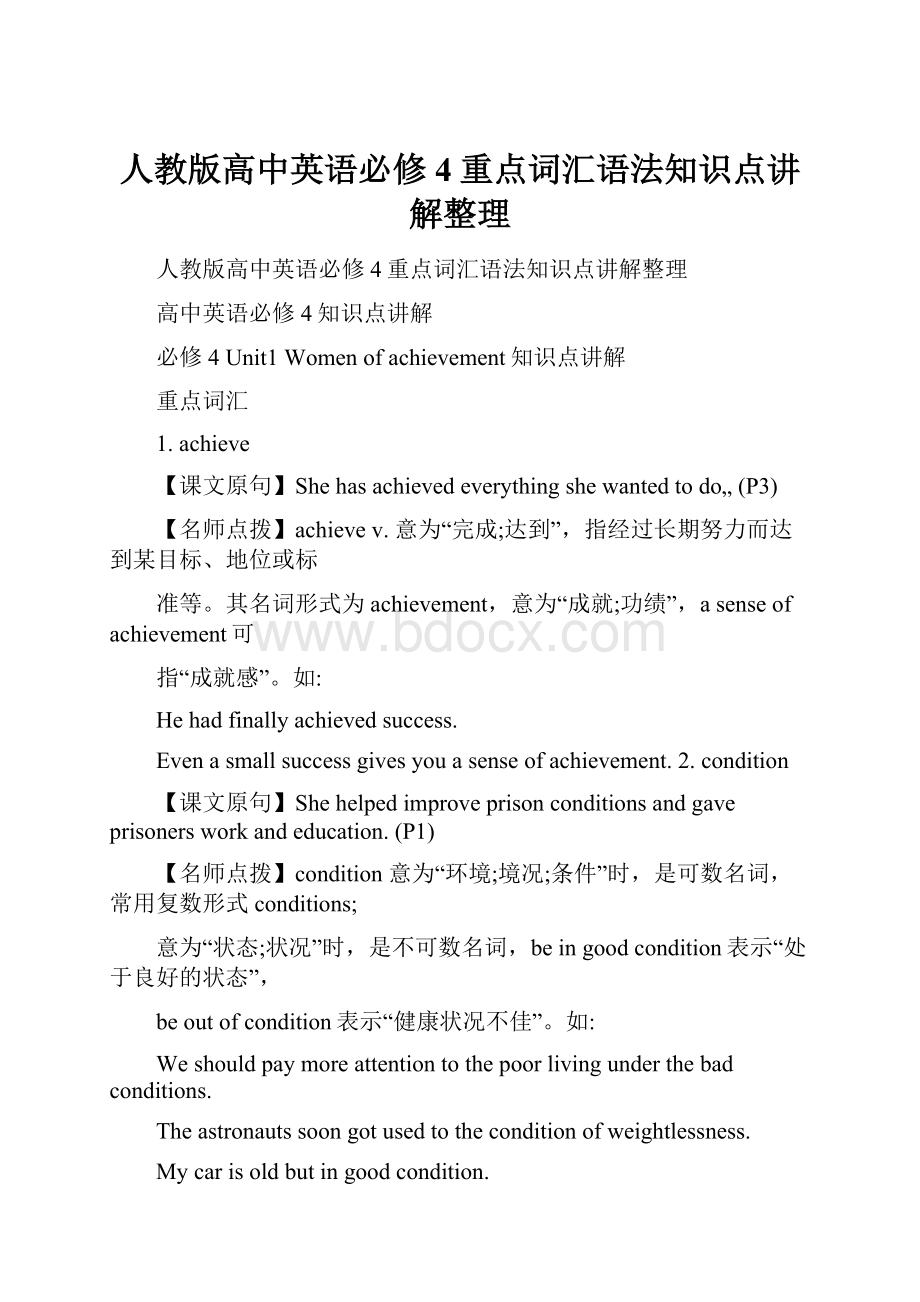人教版高中英语必修4重点词汇语法知识点讲解整理.docx
《人教版高中英语必修4重点词汇语法知识点讲解整理.docx》由会员分享,可在线阅读,更多相关《人教版高中英语必修4重点词汇语法知识点讲解整理.docx(21页珍藏版)》请在冰豆网上搜索。

人教版高中英语必修4重点词汇语法知识点讲解整理
人教版高中英语必修4重点词汇语法知识点讲解整理
高中英语必修4知识点讲解
必修4Unit1Womenofachievement知识点讲解
重点词汇
1.achieve
【课文原句】Shehasachievedeverythingshewantedtodo„(P3)
【名师点拨】achievev.意为“完成;达到”,指经过长期努力而达到某目标、地位或标
准等。
其名词形式为achievement,意为“成就;功绩”,asenseofachievement可
指“成就感”。
如:
Hehadfinallyachievedsuccess.
Evenasmallsuccessgivesyouasenseofachievement.2.condition
【课文原句】Shehelpedimproveprisonconditionsandgaveprisonersworkandeducation.(P1)
【名师点拨】condition意为“环境;境况;条件”时,是可数名词,常用复数形式conditions;
意为“状态;状况”时,是不可数名词,beingoodcondition表示“处于良好的状态”,
beoutofcondition表示“健康状况不佳”。
如:
Weshouldpaymoreattentiontothepoorlivingunderthebadconditions.
Theastronautssoongotusedtotheconditionofweightlessness.
Mycarisoldbutingoodcondition.
Heisoverweightandoutofcondition.
【知识拓展】condition意为“条件”时,常用短语onconditionthat,表示“如果;在„„
条件下”;在美国英语中,也经常用undertheconditionthat。
如:
IwillcomeonconditionthatPeterisinvited.
Theyagreedundertheconditionthatthematterbedealtwithquickly.3.devote
【课文原句】ShedevotedallherlifetomedicalworkforChinesewomenandchildren.(P1)
【名师点拨】devotevt.意为“投入于;献身”,其宾语后常与介词to搭配,to后接名
词、代词或动名词。
devote„to„意为“献身;致力于”,指把自己、时间、精力等
奉献给某种工作或事业。
如:
Hehasdevotedhiswholelifetobenefitingmankind.
Thegirl,towhomhewasdevoted,diedinatrafficaccidentbychance.Afterhehasretired,hewilldevotehimselftogardening.4.behave
【课文原句】Janehasstudiedtheseanimalsformanyyearsandhelpedpeopleunderstandhowmuchtheybehavelikehumans.(P2)
【名师点拨】behavevi&vt.意为“举动;举止;行为表现”,如behavewell/badly
等。
其名词形式为behaviour,指“行为;态度;举止”。
如:
Theparentsencouragedthechildrentobehavewellinfrontoftheguests.Mycamerahasbeenbehavingwellsinceitwasrepaired.Everyonepraisesthechildren'sgoodbehaviour.
5.worthwhile
【课文原句】Buttheeveningmakesitallworthwhile.(P2)
【名师点拨】worthwhileadj.意为“值得做的;值得出力的”,可作表语或定语。
be
worthwhiletodo/doingsth表示“值得做„„”,在动词-ing形式的结构中,worthwhile
有时可以用来替代worth,特别是在表示“值得花时间”这一概念时。
如:
Ithinkteachingschoolisalwaysaworthwhilejob.
Thebookreferredtobytheprofessorisworthwhile/worthreading.6.observe
【课文原句】Janespentmanyyearsobservingandrecordingtheirdailyactivities.(P2)
【名师点拨】observevt.意为“观察;观测;遵守”,可用observesbdosth,observe
+that从句。
其名词形式为observation。
如:
Iobservedthemanwhomurderedtheboyentertheshop.Heobservedthatweshouldprobablyhaverain.
Mostinformationwascollectedbydirectobservationoftheanimals’behaviour.
7.argue
【课文原句】Shehasarguedforthemtobeleftinthewildandnotusedforentertainmentoradvertisements.(P2)
【名师点拨】argue作动词时,意为“争论;争吵;争辩”。
arguefor意为“为„„辩护”;
arguewithsbabout/oversth指“就某事和某人争论”;argueagainst意为“据理
反对;争辩„„”。
如:
Itisnousearguingfortheplanbecauseithasbeenrejected.Wearealwaysarguingwitheachotheraboutmoney.
Fatherarguedfiercelyagainstanyincreaseinexpenditureforthechildren’sannualparty.
【知识拓展】argue的名词形式为argument,意为“争论;争端;论证”,常构成短语
settleanargument指“解决争端”。
9.carefor
【课文原句】Itwasasmallbookexplaininghowtocutthedeathratefromhavingandcaringforbabiesbyfollowingsomerulesforkeepingbabiescleanandhealthy.(P6)
【名师点拨】carefor可以表示lookafter的意思,意为“照顾;照料”,且较正式;也
可表示“喜欢”的意思。
如:
Hissoncaredforhimwhenhewasill.
Infact,Idon’treallycareforbasketball.
另外,在上面的句子中,explain意为“解释,说明”,后可接名词、代词、从句或wh+
todo作宾语,可用explainsthtosb或explaintosbsth。
如:
Willyouexplaintoushowwecanfinishtheworkassoonaspossible?
【知识拓展】careabout意为“介意;在乎”,表示是否认为某事是重要的,某事是否引
起了某人的兴趣或使其忧虑。
最常用于疑问句或否定句中。
about用在宾语前面,但是在
连词前面一般省掉。
Idon’tcareaboutyouropinion.
Idon’tcarewhetheritrains—I’mhappy.
10.intend
【课文原句】Ilookedcarefullyatthetextandrealisedthatitwasintendedfor
womenwholivedinthecountryside.(P6)
【名师点拨】intendv.意为“打算;计划;想要”。
intendtodosth意为“想干某事”;
intend后也可以接动词-ing形式或that从句。
intendfor表示“原打算给某人;准备让„„
干„„”。
如:
Iintendedtocometoyourhouselastnightbutitrained.
Iintendcoming/tocomebacksoon.
Hehadn’treallyintendedthattheyshouldbethere.
Thisgiftisintendedforyou.
热点语法
主谓一致用法难点小结:
一、集合名词作主语时的主谓一致。
1.集合名词有family,team,group,party,class,public,club,crew,crowd,enemy,audience,company,committee,government,population等,当被看作一
个整体时,表示单数意义,谓语动词用单数形式;如果这些集合名词指其中的每个成员,表
示复数意义,谓语动词则用复数形式。
即谓语动词的单复数要与主语的含义相一致。
如:
Myclassisabigone,includingthirtyboysandthirtygirls.Myclassareworkinghardforthecomingexam.
2.有些集合名词作主语时,谓语只能用复数形式,如:
people,thepolice,themilitary,mankind,cattle等。
如:
Thepolicearesearchingforthelostchild.
二、不定代词作主语时的主谓一致。
不定代词anyone,anybody,anything,everyone,everybody,everything,someone,somebody,noone,nobody,nothing,each,theother等作主语时,谓
语动词用单数。
如:
Everythinggoeswellwithme.
EachofthestudentsinourclasshasanEnglish-Chinesedictionary.三、“名词,名词”作主语时的主谓一致。
当表示同一人物或观点时,谓语动词用单数。
如:
Anovelistandplaywrightiscomingtoourschool.这里表示“一位小说家兼剧作家”,是同一个人,所以谓语动词
用单数。
如果是Anovelistandaplaywright作主语,这时表示“一位小说家和一位剧作
家”,是两个人,所以谓语动词用复数,该句应改为:
Anovelistandaplaywrightarecomingtoourschool.
四、The,adj.作主语时的主谓一致。
当The,adj.表示抽象的含义时,谓语动词用单数。
如:
Thebeautifulisthetrue.当The,adj.表示该类全体的含义时,谓语动词用复数。
如:
Therichshouldhelpthepoor.
必修4Unit2Workingtheland知识点讲解
Unit2Workingtheland
PhrasesandIdioms
1.besatisfied(with):
pleasedbecauseyouhavegotwhatyouwant1)Janeisn'tquitesatisfiedwiththewaythebarbercutherhair.2)Ifyouarenotcompletelysatisfied,youcangetyourmoneyback.3)Iamnotreallysatisfiedwiththejobyoudid.2.referto:
a)mentionorspeakaboutsomeoneorsomethingb)tolookatahookmap,pieceofpaper,etc,forinformation1)Weagreednevertorefertothematteragain.
2)Althoughshedidn'tmentionanynames,everyoneknewwhoshewasreferringto.
3)Hegavethespeechwithoutreferringtohisnotesevenonce.
3.wouldrather:
usedtosaywhatsomeoneprefers
1)Itseemsyouwouldratherplaythanwork.
2)Shewouldratherdiethanlosethechildren.
3)Iwouldratherstarvethanbedependentonanyoneagain.
4.thankstosb/sth:
becauseofsb./sth.
1)Iwaslatethankstotheheavytraffic.
2)ItwasthankstohisadvicethatIsucceeded.
3)We'vecollected$50,000forthepoor,thankstothegenerosityofthepublic.5.ridofsb/sth:
becomefreeof
1)Willscience-finallyridusofthisdisease?
2)Doyouthinkitpossibletoridtheworldofnuclearweapons?
3)Byworkingharddayandnight,sheistryingtoridherselfoflonelinessandsadness.
6.leada...life:
liveinthewaywhatyoulifeislike
1)Beforeliberation,mygrandpaledadog'slife.
2)Iftheoperationsucceeds,thepatientwillbeabletoleadanormallife.3)Mrs.Blackisretiredandleadsaquietandpeacefullifeinamountainvillage.7.careabout:
love;beinterestedin;beconcernedwith
1)Justlisteningtosomebodyshowsyoucareaboutthem.
2)Yourparentsareonlydoingthisbecausetheycareaboutyou.3)Theonlythingthisrich-andgreedymanseemstocareaboutismoney.8.insistonsth/doingsth:
todemandthatsomethingmustbedoneorthat
youmusthaveaparticularthing
1)Theschoolinsistsongoodbehaviourfromitsstudents.
2)Johninsistedondoingalltheworkhimself,thoughhewasinpoorhealth.
3)TheoldmaninsistedonhelpingmefindataxieventhoughItoldhimIdidn'tneedanyhelp.
必修4Unit3Atasteofhumor知识点讲解
Unit3重点汇集
1.content
【课文原句】Perhapsitmakesusfeelmorecontentwithourlifebecausewefeelthereissomeoneelseworseoffthanourselves.(P17)
【名师点拨】contentadj.意为“满足的;满意的”,becontenttodo意为“乐意去做
某事”;becontentwithsb/sth意为“对某人或某事感到满意”,相当于bepleased
with或besatisfiedwith。
如:
I’mcontenttohelpyoutosetupawebsiteontheInternet.
Thosewhoarenotcontentwiththeprogresstheyhavemadewillhavegreatersuccess.
注:
worseoff是badlyoff的比较级,意思是“境况比„„更差”;betteroff意为“境
况比„„好”。
如:
Tomysurprise,Ifoundhislivingconditionsweremuchworseoffthanmine.Withthedevelopmentofeconomy,moreandmorepeoplearebetteroff.【知识拓展】content还可作动词,意为“使满足”;作名词时,表示“满足;心满意足”,
也可表示“(书、报纸等的)内容;目录;含量”。
如:
Myexplanationseemedtocontenthim.
Nowshebegantoliveinpeaceandcontent.
We'vediscussedtheunusualformofthebook—now,whataboutthecontent?
2.astonish
【课文原句】However,someactorscanastonishuswiththedeepfeelingstheycaninspireinusforacharactertheyareplaying.(P17)【名师点拨】astonishvt(意为“使大为吃惊;使惊异”,比surprise程度强,比shock
程度弱。
如:
Iwasastonishedtohearthattheprofessorhadbrokendownbecauseofhishardwork.
Iwasastonishedbyhowmuchshe'dgrown.
【知识拓展】
(1)astonishingadj(意为“令人惊异的”。
如:
Theastonishingnewsmadetheworldastonished,andagreatmanypeopleexpressedtheiropinionsontheInternet.
(2)astonishedadj(指(某人)处于惊异、吃惊状况,常用beastonishedatsth。
如:
HewasastonishedatwhatTomhadsaidanddone.
(3)astonishmentn.意为“惊讶”,可用toone’sastonishment表示“使某人吃惊
的是”。
如:
Tomyastonishment,shestillrememberedmybirthday.
3.particular
【课文原句】Hebecamefamousforusingaparticularformofacting,includingmimeandfarce.(P17)
【名师点拨】particularadj.意为“专指的;特别的;格外的;不寻常的”。
beparticular
about/oversth意为“对某事很讲究/很挑剔”。
inparticular意为“特别地”。
如:
Therewasnothinginthenewspaperofparticularimportance.I'mnotparticularaboutmyclothes;Idon'tmindwhatIwear.Hetalkedabouttheballgamesingeneralandtalkedaboutfootballinparticular.Whatinparticulardidyoulikeaboutthelastapartmentthatwesaw?
4.worn-out
【课文原句】Heplayedapoorandhomelessperson,whoworelargetrousers,worn-outshoesandasmallroundblackhatandcarriedawalkingstick.(P18)【名师点拨】wo